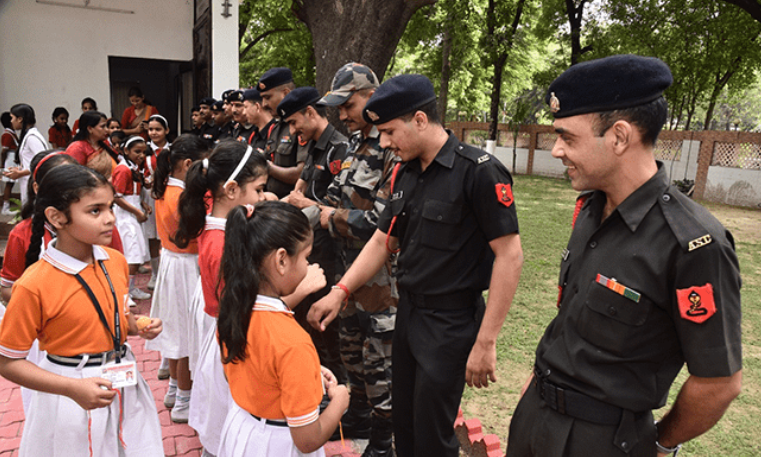By
Finish off the deshdrohi (traitor)! This is the BJP’s new war cry. And the Opposition is reportedly being put on the defensive in the small towns of Uttar Pradesh. This is dangerous, primarily because the logical conclusion of jingoism is war.
Following the crackdown on the Capital’s Jawaharlal Nehru University, where a handful of people, probably not all of them students, shouted anti-India slogans, the BJP has set off a new nationalism discourse. The Hindutva brigade now waves the tricolour, rather than its traditional saffron pennant, and militantly accuses the rest of the political spectrum of being anti-national. Doctored videos, morphed pictures, their wide dissemination on TV channels and the social media and poisonous propaganda amplify the message.
Hindutva vs Hinduism
It would be facile to see this political shift on the part of the BJP as being tactical: the government is unlikely to deliver on its Achhe Din (good times) promise, given the global headwinds for the economy and the slow progress on cleaning up the systemic mess in power, banking and corporate governance, without which investment and growth will struggle to accelerate. Hence the need for rabblerousing political platform.
Such a reading underestimates the BJP and treats it just like any other political party packed with people on the make and gunning for power for the sake of power. The BJP is indeed a party with a difference. It has an ideological mission, assigned by its parent, the Rashtriya Swayamsevak Sangh. The BJP calls its mission cultural nationalism. Containing culture and nationalism, both considered in a positive light, this goal resonates with respectability.
However, the operative intent of cultural nationalism is neither anaemic nor respectable: it is to reduce non-Hindus to second-class citizens by redefining Indian nationhood as Hindutva. Hindutva is altogether different from the eclectic, inclusive religion and its practice that the people of this land know as Hinduism.
Hindutva is exclusivist, whereas Hindus are perfectly willing to worship at a Christian or a Muslim shrine if that would bring them some relief from distress. Hindutva is monolithic, intolerant of deviation from a paradigm it deems valid, whereas Hinduism is infinitely flexible, allowing people to find their spiritual equilibrium whichever way they like, worshipping Ram or Ravan or no one in particular, resorting only to pursuit of knowledge or to dedicated conduct of duty.
Hindutva sees other religions as infractions of cultural integrity, while Hinduism sees spiritual diversity as perfectly natural and an integral part of the culture. Hindutva is militant, whereas Hinduism is accommodative, flexible and assimilative.
Kumar Gandharva singing Kabir is a representative face of Hinduism. Sadhvis fulminating against Muslims are the face of Hindutva in its operative mode.
Hindutva in its seminar-circuit mode has, of course, more moderate, articulate spokesmen, chanting cultural nationalism or development as the redeeming, legitimising mantra, as the occasion demands.
The binary division of the land into deshbhakts and deshdrohis finds complete congruence with the BJP’s fundamental mission. Those who do not accept Hindutva are branded as anti-nationals. Muslims, proselytising Christians and godless communists were always easy to brand as toxic, alien contamination. Now, after Rahul Gandhi lent his support to the 8,000-strong student community of JNU reviled by the Sangh Parivar as traitors, the BJP has branded the Congress also as deshdrohis.
Perils of Jingoism
Beef-eaters are deshdrohis. Worshippers of Mahishasura are deshdrohis, as are those who quibble about freedom of speech when the nation is under attack. Deshdrohis cannot be allowed to open their mouth in defence, they should be lynched, beaten up in the court and on the street.
This kind of nationalism leads to emotion and frenzy, not to dialogue or reasoned debate. Jingoistic frenzy on the campaign trail — winning Uttar Pradesh in 2017 is critical for the BJP to return to power in Delhi in 2019 — cannot be countered with lectures on nationalism. It calls for a snappy response, derived from the discourse of the freedom struggle.
Those who seek to exclude millions of Indians from the nation are the deshdrohis. Those who conflate Muslims with Pakistan and brand them anti-national are the real deshdrohis. Those who refuse to respect the Dalit demand for respect are deshdrohis. Those who seek to plunder tribal lands and oust tribal people from their homes, flouting the law of the land but using the full force of the state, and thereby create easy recruits for Maoists, are the real anti-nationals.
Unless this strategy of whipping up nationalist frenzy is countered vigorously, the impact would not be limited to electoral fortunes. When jingoistic passion runs high across the land, any grave provocation from across the border — including by non-state actors — will call for a tough response — or politics by other means, to borrow an exotic phrase.
This story was first appeared on economictimes.indiatimes.com






